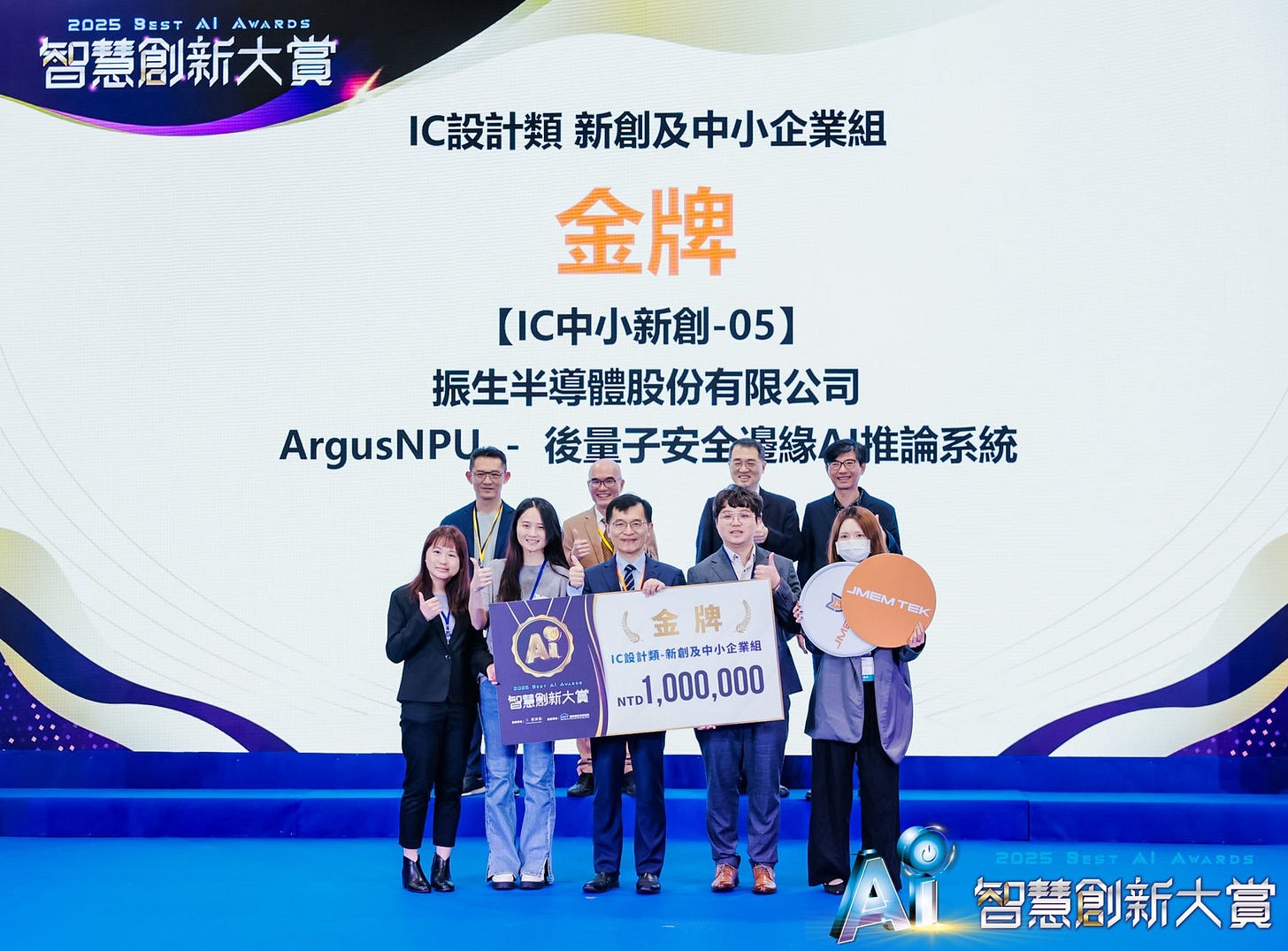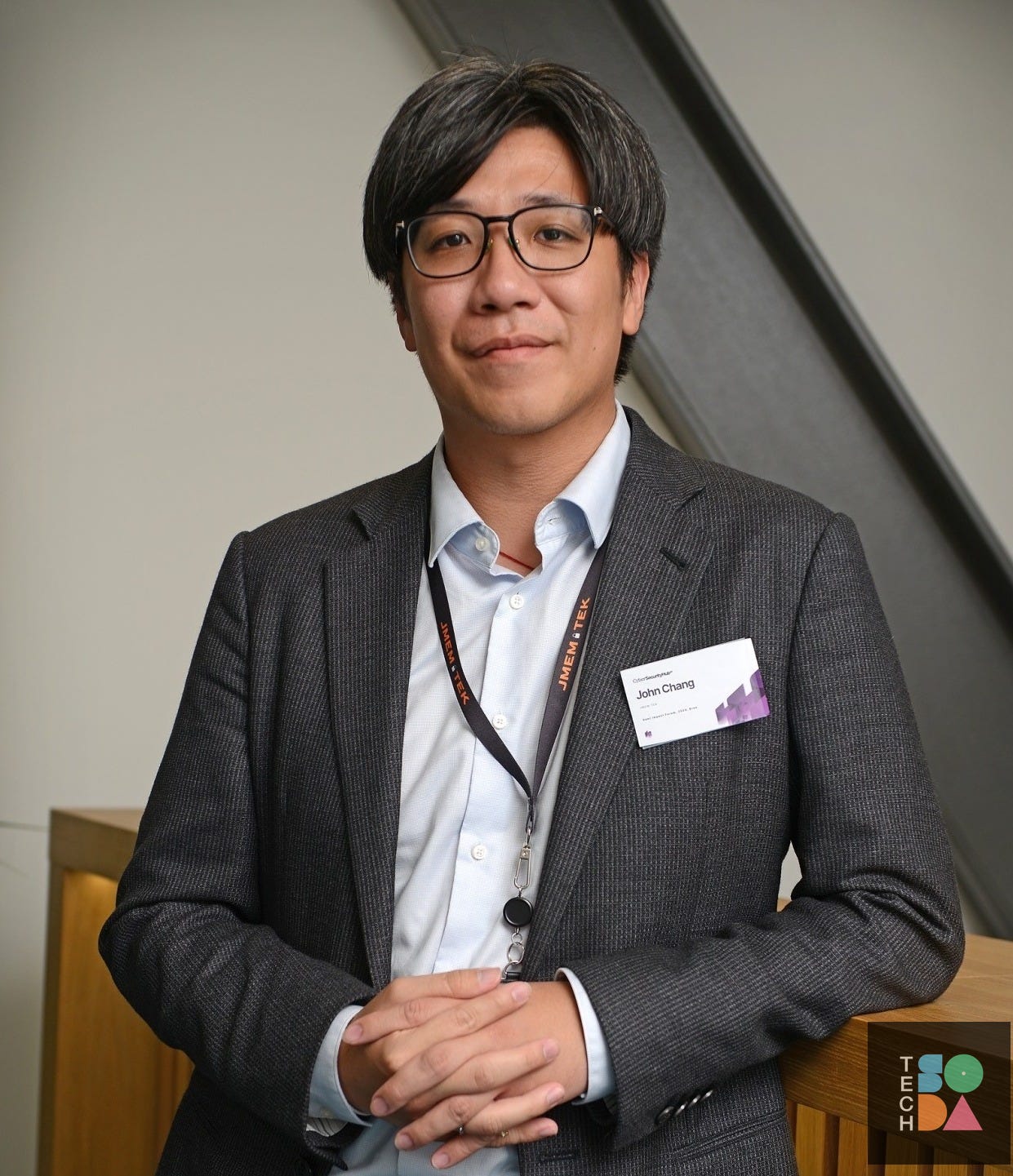
Jmem Tek, a Taiwan-based IC design startup that is the global first in providing a hardware solution for semiconductor security, is embedding post-quantum cryptography (PQC) directly into semiconductor hardware, strategically positioned to seize the burgeoning opportunities of the edge AI era.
Team Jmem Tek has just won the IC Design category of the Startup and SMEs Gold Award from the inaugural 2025 Best AI Award sponsored by Taiwan’s Ministry of Economic Affairs (MOEA). It’s “ArgusNPU – PQC security edge AI inference system” won the praise of the jury for providing AI inference capabilities with post-quantum cryptography on edge devices to protect sensitive data and enable high-performance AI applications.
In an exclusive interview with TechSoda, Co-founder and CEO John Chang projected exponential growth for PQC hardware solutions by 2030, driven by escalating security demands.
Chang underscored the immense potential, referencing industry forecasts projecting a 95.2% compound annual growth rate for the PQC security market from 2024 to 2030, with a total addressable market reaching an estimated US$290 billion by 2030-2033.
“We were the first and remain the only company worldwide to integrate both PQC and physically unclonable function (PUF) within semiconductor hardware,” Chang stated. He elaborated on their comprehensive security solution, which incorporates a quantum-resistant processor alongside a Root-of-Trust module comprising One-Time Password (MSOTP), PUF, and a true random number generator (TRNG). This is further fortified by four dedicated cryptography processors supporting SHA3, AES, and the NIST-approved post-quantum signature schemes Kyber and Dilithium.
Jmem Tek’s integrated hardware and software approach establishes a multi-layered defense, crucial for preventing data breaches during transmission between cloud and edge devices. Chang emphasized the inherent reliability of this bundled hardware-software security.
Founded in October 2022 by John Chang and Paul Lo, National Yangming Chiaotung University electrophysics Ph.D. graduates, Jmem Tek’s initial focus on OTP solutions against cyberattacks quickly evolved to incorporate quantum cryptography. Chang noted the rapid advancements in PQC and the pivotal 2024 US government approval of three PQC standards, mandating their inclusion in products by January 2027.
Competitive Advantages and Competitor Landscape
Chang highlighted the impending need to replace all non-PQC systems by 2030, coinciding with the advancements in quantum computing innovations by major players like Google, Microsoft, and AWS. This foresight led Jmem Tek to begin integrating PQC into their chips in 2024.
The company’s AI Edge Secure Scheme and framework enable seamless application integration for customers. “Our IP computation boasts 23 times the speed of traditional solutions, while our MCU PQC achieves a 100-fold acceleration. Our framework-based and customizable approach caters directly to customer needs,” Chang explained. He further underscored their superior performance, citing a 200x improvement in latency and a 3000x gain in energy efficiency compared to existing software solutions.
Jmem Tek has successfully taped out several chips using TSMC’s 28nm and 40nm processes and is advancing to 12nm this year in response to customer demand. Notably, they partnered with Andes Technology to unveil the world’s first QPC RISC-V chip, the N25F RISC-V processor, in January 2025.
While IC design companies like MXTran and eMemory Technology offer OTP, TRNG, and are now working on AI modeling solutions primarily for automotive applications, Jmem Tek has established a strong presence in the NFC and smart card industries, with growing traction in drone and defense sectors. Their sights are now set on the AIoT and automotive markets, where Chang emphasized the critical need for robust cybersecurity in connected and autonomous vehicles, revealing an ongoing validation partnership with a Tier 1 automotive supplier.
Exponential Growth
Jmem Tek’s team has expanded dramatically from three to nearly 40 individuals in under three years, including the establishment of a Silicon Valley office for technology support and sales.
The adoption of PQC and AI features by companies like Hewlett Packard in their printers signals a broader trend driven by regulatory requirements in major economies like the US and EU.
Jmem Tek’s business model encompasses IC design fees for custom projects and royalties from IP licensing. They also offer plug-and-play chip dongles for immediate equipment protection, with plans for a next-generation product as small as a thumb, according to Marketing Manager Kiki Chen.
The company’s promising outlook has attracted significant investor interest, with a recently completed US$5 million pre-A round led by Pegatron. Other investors include Infinio, Mosaic, IPS, SparkLabs, Andes Technology, and Silicon Catalyst, etc. Jmem Tek has also participated in Nvidia’s Inception Program for startups.
Future Roadmap
John Chang envisions Jmem Tek’s continued expansion into diverse verticals such as AIoT, drone/defense, smart healthcare, aerospace, and telecommunications.
“Currently, we are building the security foundation, focusing on inclusion, inquisition, and authentication,” Chang explained, highlighting the ongoing development. “Future advancements will encompass encoding/decoding, validation, and key protection, enabling customers to seamlessly integrate their applications onto our security foundation across various markets like financial services, autonomous driving, drones, and defense.”
Jmem Tek is also strategically expanding its global footprint, including a collaboration with the Czech Republic government to train engineers, followed by the establishment of an office in the country. While their R&D team is currently based in Taipei, a new office in Hsinchu is also planned.
Driven by government mandates for strong device cybersecurity and the increasing adoption of custom ASICs, Jmem Tek anticipates significant growth.
Are there challenges that Jmem Tek should be aware of? Frankwell Lin, CEO of Andes Technology, one of the investors and advisors to the startup, recognizes the company’s technological advantage and the management team’s excellent growth plans and positive traction.
“As for challenges, since they are still young, they are not afraid to challenge competitors. It is recommended to cultivate a culture of humility - even competitors should be respected,” said Lin.
Taiwan’s robust IC design and cybersecurity talent pool provide readily available resources to support this expansion. As a pioneering provider of integrated software-hardware security solutions, Jmem Tek is leveraging the advancements in quantum computing, post-quantum cryptography (PQC), and the rapid progress in advanced semiconductors and AI, securing a crucial first-mover advantage.


